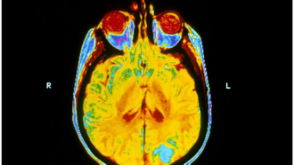
Secondary brain tumours (or metastases) in lung cancer patients are usually treated with whole brain radiotherapy
Whole brain radiotherapy is of no benefit to people with lung cancer which has spread to the brain, says research in the Lancet.
A trial of more than 500 patients found that it did not prolong or improve their quality of life any more than other forms of treatment.
More than 45,000 people are diagnosed with lung cancer every year in the UK.
In a third of cases, the cancer will spread to the brain.
Secondary brain tumours are usually treated with whole brain radiotherapy along with steroids and other treatments to reduce the side-effects of cancer therapies.
But it can have serious side-effects, such as nausea and extreme tiredness, and cause damage to the nervous system.
This study, involving doctors, researchers and patients from hospitals right across the UK, found that there was no improvement in the quality of life of patients after one week of whole brain radiotherapy.
These patients tend to already have a poor prognosis.
Toxicity
Dr Paula Mulvenna, consultant clinical oncologist with Newcastle Hospitals NHS Foundation Trust, said whole brain radiotherapy was used because it was thought to control tumours.
"But in our lung cancer clinics, we were not seeing the improvements we had hoped for in our patients.
"Survival times are poor and have hardly changed since the 1980s.
"What's more, the technique's toxicity can be substantial and it can damage cognitive function."
According to Prof Ruth Langley, from the Medical Research Council clinical trials unit at University College London, radiosurgery - a very precise form of radiotherapy - is a favoured alternative technique, which has minimal side-effects.
But some scientists say there may still be a place for whole brain radiotherapy.
Writing in a linked comment in the Lancet, Dr Cecile le Pechoux from Gustave Roussy Cancer Campus in France said: "We believe that optimised whole brain radiotherapy, given at the right time to appropriate patients, could lead to more individualised strategies."
They said all treatments should be discussed with patients, taking into account the result of this trial.



